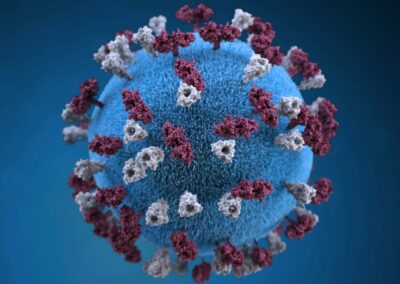The Impact of AI on Personalized Treatment Plans for Autoimmune Diseases
Harnessing AI for Tailored Medical Solutions
In the realm of autoimmune diseases, the use of artificial intelligence (AI) is transforming how personalized treatment plans are developed. AI technologies enable healthcare providers to analyze vast amounts of patient data, including genetic information, medical history, and real-time health metrics, to create highly individualized treatment strategies. By leveraging machine learning algorithms, AI systems can identify patterns and correlations that are not immediately apparent to human clinicians. This capability allows for the development of tailored treatment plans that address the unique needs of each patient, enhancing the effectiveness of therapies and improving overall patient outcomes.
AI-driven platforms can process complex datasets to predict disease progression and response to treatments, thus enabling more precise interventions. For example, AI can analyze biomarkers and patient responses to identify the most effective medications and dosages for managing autoimmune diseases. This approach not only personalizes treatment but also minimizes trial-and-error in therapy selection, reducing the time and resources spent on ineffective treatments. By integrating AI into the treatment planning process, healthcare providers can offer more targeted and effective care, ultimately leading to better management of autoimmune conditions.
Optimizing Therapies Through Data-Driven Insights
One of the key advantages of AI in developing personalized treatment plans is its ability to optimize therapy choices based on comprehensive data analysis. AI systems can integrate data from diverse sources, including electronic health records, clinical trials, and patient-reported outcomes, to generate actionable insights for treatment optimization. By analyzing this data, AI can identify the most promising therapeutic options and predict how patients will respond to different treatments.
For instance, AI algorithms can analyze trends in patient data to determine the likelihood of adverse reactions or side effects associated with specific therapies. This information helps clinicians make informed decisions about which treatments to prioritize and which to avoid. Additionally, AI can facilitate the discovery of new treatment modalities by analyzing patterns in existing therapies and identifying potential new drug candidates or combination therapies. This data-driven approach not only enhances the precision of treatment plans but also accelerates the development of innovative therapies for autoimmune diseases.
Leadership and Implementation in AI-Driven Healthcare Solutions
Leading the Integration of AI in Healthcare
For executives and healthcare leaders, effectively integrating AI into the development of personalized treatment plans requires strategic planning and strong leadership. It is essential to understand both the potential benefits and the challenges associated with implementing AI technologies. Leaders must advocate for the adoption of AI tools, ensure that their teams are trained to use these technologies effectively, and establish frameworks for evaluating and managing AI-driven insights.
Executive coaching services can be instrumental in helping leaders navigate the complexities of AI integration. Coaching can provide leaders with the skills needed to drive innovation, manage change, and foster a culture of data-driven decision-making. By investing in leadership development, healthcare organizations can better position themselves to leverage AI technologies for personalized treatment and enhance patient care outcomes. Effective leadership in this context involves not only embracing AI advancements but also addressing ethical and practical considerations associated with their use.
Generative AI and Future Innovations in Autoimmune Disease Treatment
The future of AI-driven personalized treatment for autoimmune diseases is promising, particularly with the advent of generative AI technologies. Generative AI, which involves creating new data or models based on existing information, can contribute to the development of novel treatment approaches and enhance personalization. For example, generative AI can simulate various treatment scenarios and predict their outcomes, helping clinicians to select the most effective therapies for individual patients.
Moreover, the integration of generative AI with other emerging technologies, such as blockchain, can further enhance the reliability and transparency of patient data used in treatment planning. Blockchain can provide secure and immutable records of patient data, ensuring that AI systems have access to accurate and up-to-date information. This combination of generative AI and blockchain can lead to more innovative and trustworthy approaches to managing autoimmune diseases, ultimately advancing the field of personalized medicine.
Conclusion
AI-driven personalized treatment for autoimmune diseases represents a significant advancement in healthcare, offering the potential for more effective and tailored therapeutic strategies. By leveraging advanced data analysis and machine learning algorithms, AI enhances the precision and efficiency of treatment plans, optimizing patient outcomes and accelerating the development of innovative therapies. For business executives and healthcare leaders, embracing AI technologies and developing the necessary leadership skills are crucial for successfully integrating these solutions into healthcare practices. As AI continues to evolve, its role in personalized medicine will undoubtedly grow, offering new opportunities for improving patient care and advancing the field of autoimmune disease management.
—
#AIDrivenTreatment #PersonalizedMedicine #AutoimmuneDiseases #PatientDataAnalysis #ArtificialIntelligence #HealthcareTechnology #GenerativeAI #ModernMedicine #LeadershipinHealthcare #ExecutiveCoaching































